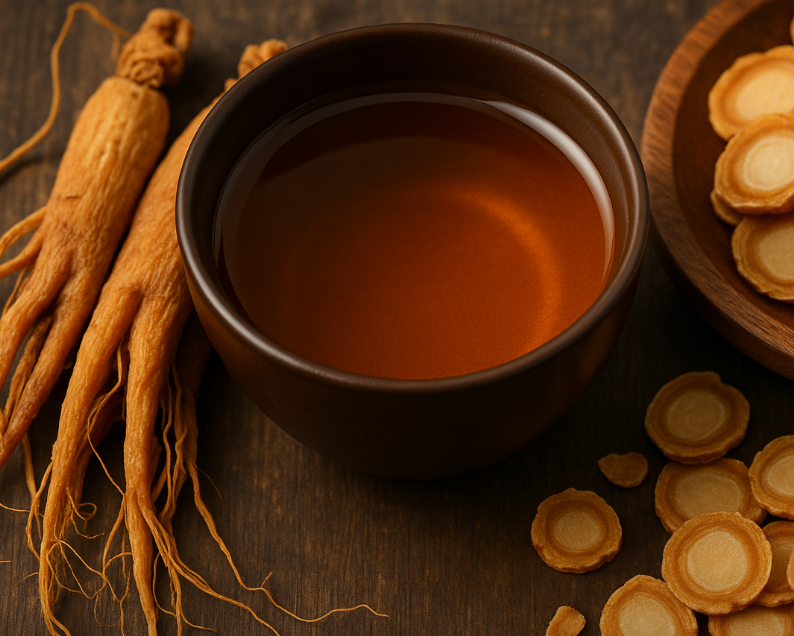Korean ginseng tea, made from Panax ginseng roots, represents a bridge between ancient herbal tradition and modern functional nutrition. In 2025, this tea is gaining renewed attention worldwide as researchers explore its benefits for energy, immunity, cognitive performance, and overall wellness. While ginseng tea has long been part of East Asian culture, it is now positioned as a global wellness beverage supported by science.
Historical and Cultural Background
For centuries, ginseng tea has been consumed in Korea as both a medicinal tonic and daily refreshment. Traditionally brewed from dried or sliced roots, ginseng tea was served to royalty, scholars, and elders to improve stamina and clarity of mind. Unlike coffee or black tea, it was viewed not only as a stimulant but also as a holistic remedy—balancing the body’s energy, reducing fatigue, and fostering long-term resilience.
Key Health Benefits of Korean Ginseng Tea
1. Energy and Fatigue Reduction
Ginseng tea is valued for its adaptogenic qualities, helping the body cope with stress and fatigue. Studies show that regular consumption of ginseng extracts improves physical stamina and mental alertness, making it a natural alternative to caffeine-laden energy drinks.
2. Immune Function Support
Ginsenosides and polysaccharides in ginseng tea boost the immune system by increasing natural killer (NK) cell activity and balancing inflammatory cytokines. This makes ginseng tea especially useful during cold seasons or for those under chronic stress.
3. Cognitive Performance
Modern clinical research suggests ginseng tea supports memory, concentration, and mood stability. By reducing oxidative stress in the brain and enhancing neurotransmitter balance, it promotes mental clarity.
4. Cardiovascular and Metabolic Health
Ginseng tea contributes to better blood circulation by enhancing nitric oxide pathways, reducing arterial stiffness, and modestly improving blood pressure. In addition, some evidence shows it helps regulate blood sugar levels, making it relevant for prediabetic individuals.
5. Stress Relief and Wellness Ritual
Beyond measurable health benefits, ginseng tea functions as a mindful daily ritual. The earthy aroma and naturally bitter-sweet flavor encourage relaxation and balance—helping individuals pause during stressful modern routines.
How to Prepare and Consume Ginseng Tea
- Traditional Brewing – Slice dried ginseng root and steep in hot water for 5–10 minutes.
- Powdered Extracts – Easily mixed with hot water for a quick serving.
- Tea Bags – Convenient for travel or office use.
- Honey or Dates – Often added to balance bitterness and enhance flavor.
Recommended consumption: 1–2 cups per day, preferably in the morning or early afternoon to avoid sleep disruption in sensitive individuals.
Scientific Perspectives (2024–2025 Updates)
Recent clinical reviews confirm ginseng’s role in reducing fatigue, improving vascular health, and boosting immunity. Systematic analyses highlight ginseng tea as a safe and effective supplement when consumed regularly for 8–12 weeks. Side effects are generally mild (digestive upset or insomnia in rare cases).
Market Trends
The global functional tea market is expanding rapidly, with Korean ginseng tea leading the segment. Consumers worldwide increasingly view it as a natural, premium alternative to energy drinks, coffee, and synthetic supplements. The rise of wellness tourism in Korea has further popularized ginseng tea among international visitors.
Conclusion
Korean ginseng tea embodies the perfect harmony of tradition, science, and lifestyle wellness. It offers energy without overstimulation, immunity support without synthetic additives, and cognitive benefits backed by research. For health-conscious consumers seeking a holistic daily ritual, ginseng tea is more than just a drink—it’s an investment in long-term vitality.
🇰🇷 Premium Korean Ginseng Online Shop







